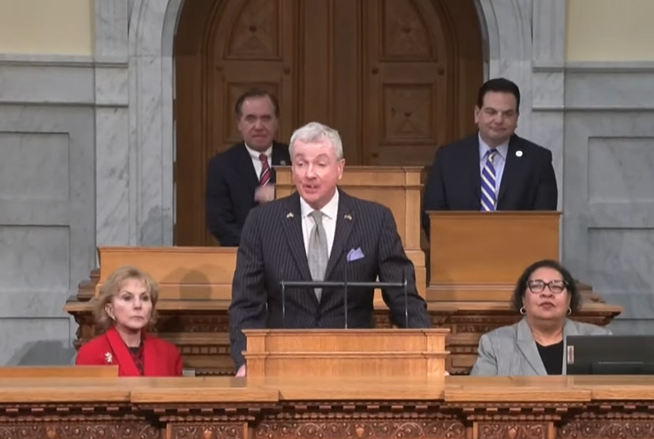A Spending Plan and a Campaign Plan

Gov. Phil Murphy’s fiscal 2024 state budget address to the Legislature was a victory lap tour of his accomplishments, a declaration of his priorities ahead, a justification of a record $53.1 billion spending plan, and a not so subtle side trip into national politics.
And it was a prepaid campaign mailer for all Democrats — incumbents and challengers alike — to lure and impress voters in this year’s legislative elections.
It was a “no voting bloc left behind” presentation whose bullet points will certainly show up, in whole or selectively, in mailboxes by October.
It was in line with the cynical observation that no governor ever got in trouble for not spending money.
Consider:
*For stressed property owners, continuation of the $2 billion homestead rebate program known as ANCHOR.
*For low income wage earners, a doubling of the child tax credit.
*For seniors, an expansion of the property tax freeze program to benefit the elderly population.
*Expansion of eligibility for the pharmaceutical assistance program for seniors.
*For the business establishment, the expiration of the corporate tax surcharge.
*For commuters using on New Jersey Transit, no fare increase.
*For the education establishment, an increase in state aid to local school districts and expansion of paid pre-K.
*For public employees, a full payment into the pension system.
*For striving homeowners, a down payment assistance program.
*For college students, an increase in tuition aid grants and an increase in income eligibility for other grant programs.
*An investment fund to finance parks and gardens in urban communities.
*A fund to rebuild and restore boardwalks in shore communities.
*An increase in direct support for higher education.
About the only item missing was a modest allocation to the Flat Earth Society to aid in its investigation to prove the globe is not truly round.
In a display of restraint, though, the budget provides a $10 billion surplus, more than sufficient Murphy claims to cushion the impact of an economic downturn in the months or year ahead and further proof that he’s imposed fiscal stability and discipline on state government.
Murphy stepped from behind the wings of state government and planted a foot on the national stage with strong rhetoric condemning those who would restrict abortion rights, ban books, undermine personal rights and freedoms, oppose gun control measures and restrict voting rights.
It was a thinly veiled assertion that while he may not be a national candidate he will have a voice in and influence over who is.
Republicans focused on the spending increase of five percent over the current fiscal year as unacceptable and a sign that Murphy is simply one more in a line of tax and spend Democrats.
They criticized the proposed $10 billion surplus as too great, arguing it was evidence that New Jerseyans are taxed too much and some of the surplus should be returned in the form of property tax relief and increased school aid.
The proposal’s failure to provide for indexing tax brackets will result in taxpayers being pushed into a higher and more expensive category, Republican argued, unfairly adding to the individual tax burden.
While Republican opposition and criticisms are legitimate concerns and deserve debate, their policy and administrative management arguments will not sway significant numbers of voters when competing with the Democrats’ dollar laden dump truck coming to their towns to offload government funds for schools, senior citizens, college students and property owners.
The progressive wing of the Democratic Party fretted that Murphy — perhaps in an effort to gain a higher national profile — had moved toward a more moderate posture, citing his support for allowing the corporate tax surcharge to expire as a giveaway to the state’s largest and most profitable corporations rather than directing the money toward new or expanded social programs.
They complained as well that the budget lacked a more aggressive approach to climate change and bemoaned another diversion of revenue from the clean energy fund.
With Democrats in firm control of both houses of the Legislature, the budget process over the next four months will resemble a pro forma exercise whose outcome has already been decided.
The document that eventually reaches Murphy’s desk in June will differ little from that he submitted in February — a few tweaks and cosmetic alternations, perhaps — but no dramatic changes that could ignite a political uproar.
It’s been said that the budget is 90 percent a political document and 10 percent a fiscal document.
By offering a plan easily adapted to campaign fodder, Murphy may have changed that equation, increasing the political impact yet maintaining its fiscal flavor, albeit in in a lesser dose.
Carl Golden is a senior contributing analyst with the William J. Hughes Center for Public Policy at Stockton University.









Leave a Reply